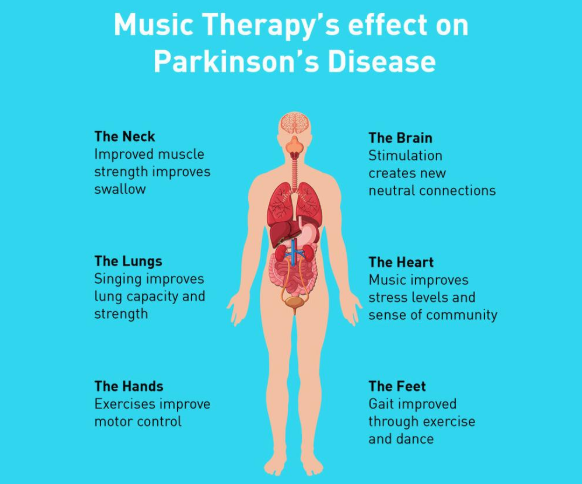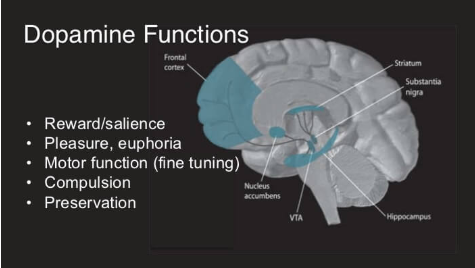In recent years, there has been an increase in research testing the positive effects music has on someone with Parkinson’s disease. Elizabeth Stegemoller is a music therapist with an Ph.D. in neuroscience and has been studying the connection between music and Parkinson’s disease for the last six years. The photo titled “Music Therapy’s effect on Parkinson’s Disease” shows what her and her research team have come to discover through their research over the last several years.

Through her research, Professor Stegemoller has found that music therapy helps to improve brain activity in many ways. For one, when a person listens to a type of music they enjoy, the chemical dopamine is released. Not only is dopamine an essential neurotransmitter for brain activity, this chemical helps with movement, motor control, attention, learning, and emotional responses. Professor Stegemoller and her team has also found that the rhythm in music helps to improve the creation of neurological connections by causing the neurons in the brain’s synapses to fire at the same time.

Photo received from “What is Dopamine and How Does it affect the Brain and the Body”
The leading cause of death for someone with Parkinson’s disease is due to complications with muscles in the neck, ie swallowing, breathing etc. During Professor Stegemoller’s research, she has formed a singing group for her music therapy participants. The group participates in vocal and choral exercises. Participants in these exercises have shown improvement in their ability to talk and swallow. The group singing activity also shown unexpected improvements elsewhere. Professor Stegemoller found that after an hour of singing, the participants had an improvement in aspects that are not related to singing at all such as a lessening of their tremors and an improvement in their overall manner of walking.
Elizabeth Stegemoller is not the only one to believe that music therapy helps individuals with Parkinson’s disease. The National Institute of Health (NIH) has been awarded $20 million dollars over the course of 5 years to support research in music treating a wide range of conditions including neurological conditions such as Parkinson’s disease. Francis S. Collins, M.D., Ph.D. director of NIH, stated that furthering the research on exactly why music has a positive effect on neurological disorders will help to improve the understanding of music therapy. In turn, improving it’s effectiveness of using it as a way to improve the quality of life for the millions of people who suffer from neurological and other disorders.
Leave a Reply